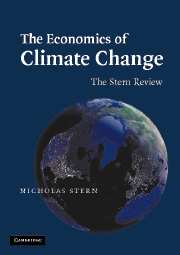Book contents
- Frontmatter
- Contents
- Preface
- Acknowledgements
- Introduction
- Summary of Conclusions
- Part I Climate Change – Our Approach
- 1 The Science of Climate Change: Scale of the Environment Challenge
- 2 Economics, Ethics and Climate Change
- 2A Ethical Frameworks and Intertemporal Equity
- Part II Impacts of Climate Change on Growth and Development
- Part III The Economics of Stabilisation
- Part IV Policy Responses for Mitigation
- Part V Policy Responses for Adaptation
- Part VI International Collective Action
- Abbreviations and Acronyms
- Postscript
- Technical Annex to Postscript
- Index
2 - Economics, Ethics and Climate Change
Published online by Cambridge University Press: 05 March 2014
- Frontmatter
- Contents
- Preface
- Acknowledgements
- Introduction
- Summary of Conclusions
- Part I Climate Change – Our Approach
- 1 The Science of Climate Change: Scale of the Environment Challenge
- 2 Economics, Ethics and Climate Change
- 2A Ethical Frameworks and Intertemporal Equity
- Part II Impacts of Climate Change on Growth and Development
- Part III The Economics of Stabilisation
- Part IV Policy Responses for Mitigation
- Part V Policy Responses for Adaptation
- Part VI International Collective Action
- Abbreviations and Acronyms
- Postscript
- Technical Annex to Postscript
- Index
Summary
KEY MESSAGES
Climate change is a result of the externality associated with greenhouse-gas emissions – it entails costs that are not paid for by those who create the emissions.
It has a number of features that together distinguish it from other externalities:
It is global in its causes and consequences;
The impacts of climate change are long-term and persistent;
Uncertainties and risks in the economic impacts are pervasive.
There is a serious risk of major, irreversible change with non-marginal economic effects.
These features shape the economic analysis: it must be global, deal with long time horizons, have the economics of risk and uncertainty at its core, and examine the possibility of major, non-marginal changes.
The impacts of climate change are very broad ranging and interact with other market failures and economic dynamics, giving rise to many complex policy problems. Ideas and techniques from most of the important areas of economics, including many recent advances, have to be deployed to analyse them.
The breadth, magnitude and nature of impacts imply that several ethical perspectives, such as those focusing on welfare, equity and justice, freedoms and rights, are relevant. Most of these perspectives imply that the outcomes of climate-change policy are to be understood in terms of impacts on consumption, health, education and the environment over time but different ethical perspectives may point to different policy recommendations.
Questions of intra-and inter-generational equity are central. Climate change will have serious impacts within the lifetime of most of those alive today.
- Type
- Chapter
- Information
- The Economics of Climate ChangeThe Stern Review, pp. 25 - 45Publisher: Cambridge University PressPrint publication year: 2007
- 28
- Cited by



